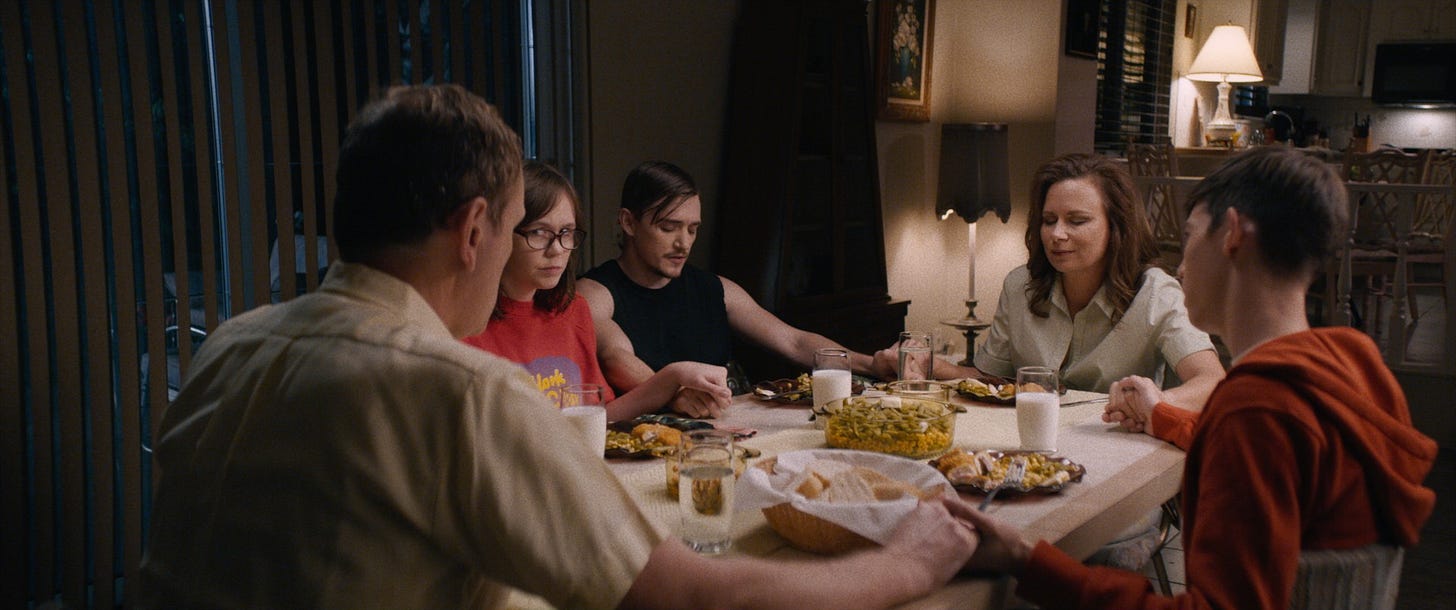How the 2020 Comedy 'Dinner in America' Does Autism Right
In a world of bad autistic portrayals this one is worth seeking out
‘’You are a total punk rocker.’’ Dinner in America, which premiered at Sundance in 2020, is a comedy-drama set in Detroit, Michigan, directed, written and edited by Adam Rehmeier. Kyle Gallner and Emily Skeggs play lead characters, Simon and Patty. Patty and Simon have had a one-sided epistolary relationship for the last two years, though Simon is completely unaware about until a chance meeting brings the two together. Simon is on the run from the law and the two develop a romance through their mutual love of punk rock music.
As I watched Dinner in America for the first time, I was taken aback by Patty and how much I saw myself in her. Identifying with this fictional character is surprising considering I’m a Black British woman in her thirties. Unlike Patty, I wasn’t infantilized growing up. I did reasonably well academically. I struggled but hid it well. Culturally speaking, there was no recognition or understanding of neurodevelopmental conditions that impacted behaviour and mental health in my life.
As a formally diagnosed autistic woman, I identified with Patty’s intense interests, perceived weirdness and struggle to discover her purpose. From an early age, I was obsessed with film and TV, read voraciously, and was seen as ‘’odd’’ and ‘’strange’’ by my peers. A childhood nickname I was given was ‘’scientist,’’ and my communication style made me a target for bullies. Skeggs’s portrayal in Dinner in America is a welcome change from the coming-of-age films where the weird girl gets the popular boy and has a makeover in the end, like John Hughes’s The Breakfast Club (which I love).
According to professor and writer Gulsabah Palinko, autistic representation in film increased in the 2000s, with approximately 35 films meeting the criteria, compared to the 1970s where there was just one. One of the earliest examples is Barry Levinson’s Rain Man (1988), wherein Dustin Hoffman plays an autistic man with savantism. Groundbreaking for its time, the film’s legacy is one perpetuated by the stereotype that autistic people have mathematical gifts of some kind, with Hoffman’s character having an uncanny talent for counting cards that his half-brother, played by Tom Cruise, exploits.
Another example is Harold Becker’s Mercury Rising (1998), an action thriller starring Bruce Willis. Willis plays a man protecting an autistic boy from the NSA who is classed as a national security threat after breaking a cypher. Neither of these portrayals depict autism with any nuance and conflate autism with savantism when they are two very different things.
These movies also show autism from a white, male perspective with narratives highlighting advanced mathematical abilities, exploitation and characters lacking independence. While this characterisation may be accurate for some autistic people, it ignores the vast array of differences in autistic women’s presentation and needs, and is not representative of everyone living with it. Stereotypes like these make it difficult for girls and women to receive an accurate diagnosis according to the National Autistic Society.
Patty is a 20-year-old junior college dropout who loves music, particularly the fictitious punk band PSYOPS. She is socially awkward, mistreated by her peers and underestimated by her family. The viewer meets Patty sitting alone at a deserted bus stop. She’s waiting to go to her job at a local pet store. The film quickly establishes what Patty’s life is like and Rehmeier’s script does not sugar-coat the bullying Patty endures because of her differences. Two jocks descend upon Patty, sexually harassing her and frequently calling her the “R” slur. Patty doesn’t challenge them. She’s silent, and by not responding the hope is that her bullies will go away. They don’t.
The jocks in the movie don’t touch Patty, but they physically grab their private parts and humiliate her with their overt sexual display. Their grotesque actions suggest Patty is sexually inexperienced and easily rattled by their behavior. This mirrors the presumption that disabled people are undesirable sexually, and incapable of experiencing sexual desire or exercising their sexual autonomy. In Patty’s case, they couldn’t be more wrong. Patty is in touch with her sexuality and she knows exactly what she wants: John Q, the masked singer of PSYOPS.
Dinner in America forgoes explicitly labelling or diagnosing Patty which allows the audience to experience her character without prejudice. When you’ve met an autistic person, you have met one autistic person. Not all autistic people have intense interests, not all autistic people drop out of school, and not all autistic people struggle with employment like Patty does. Patty is on ‘’five different medications’’ that are so strong they knock Simon out for 11 hours. It is crucial to note that Patty is misdiagnosed and overmedicated, a common experience for autistic girls and women before they receive a formal diagnosis.
As an autistic-coded character, Patty struggles with social communication. Her boss, Mr. Hanley, wants her to wash the pets at the store but does not clearly communicate this to Patty. He demands she get a ‘’rag and soapy water’’ to clean the animals but Patty takes this literally. She asks a clarifying question: ‘’Do you mean with the hand soap from the bathroom?’’ He’s exasperated with her question and frustrated that she is not moving quickly enough. The scene is a clever example of the double empathy problem coined by Dr. Damion Milton, when allistic (non-autistic) and autistic people struggle to empathize with each other due to differing ways of experiencing the world.
It is up to both parties to try to communicate with each other and ensure understanding. In reality, this burden/failure/blame falls on autistic people. ‘’From the position of the non-autistic onlooker, autistic people can seem to have an impaired understanding of social life and other people,” says the National Autistic Society. “Such ideas are embedded within dominant psychological theories that attempt to explain autism as pathology, a deviance from normal development and cognitive functioning…’”
Patty struggles to assert herself at work and with her peers, and this lack of assertiveness makes sense because her family doubts she can take care of herself. They love her, but they show it in an overbearing way. When home alone Patty is forbidden to use the kitchen appliances. There is no context for this lack of trust. She is 20 and needs her parents’ permission to attend a music gig. Patty is self-aware enough to lie to her family and say she wants to see The Alliance, rather than the punk rock group she adores, PSYOPS. Her parents deny her request and an embarrassing compromise her mother suggests cements the fact that her family has not accepted that she is a grown adult. Through Skeggs’s performance and Rehmeier’s snappy script it’s clear Patty is frustrated with them. She screams at the dinner table while clenching her fists.
Patty’s mother, played brilliantly by Mary Lynn Rajskub, has little patience for her daughter’s questions at the dinner table. A simple, ‘’Mom, what’s cumin again?’’ is met with impatience. ‘’Honey, let’s not do this tonight. Just eat your salad, please,” her mother replies. Even her adopted brother, Kevin (Griffin Gluck) calls her the R slur in front of their parents and Simon. Her parents chastise Kevin for exposing the chicken cordon bleu as a frozen meal rather than bullying his sister with the ableist slur.
Patty is used to this verbal abuse, as evidenced by the slurs and literal barking the bullies on the bus subject her to on her ride home, and it is uncomfortable to watch her internalize it. The scene speaks to the sad reality that ableism occurs not only externally, but in the family home where one should be safe and able to express oneself freely and honestly.
When Patty first meets Simon she’s intrigued by him. She recognizes they were both in the same music appreciation class in junior college before she dropped out. It’s the first time Dinner in America hints at the two’s love of music and loose acquaintance. Simon is initially only interested in finding a new place to hole up and hide from the cops. He assesses Patty and notes her naivety after she discloses the reason Mr. Hanley gave for firing her. At her suggestion, they go to her home.
Once there, Simon casually uses homophobic slurs, anything to elicit a reaction from her. She ignores it, not understanding his agenda and failing to read between the lines of the homophobic quips he makes about her family photos that decorate the walls. Simon gets off on getting a reaction out of people, but Patty isn’t like any person he’s ever met. Her failure to be triggered by him sparks his curiosity in her.
There’s a delightful sexual tension between the two of them, which we see in the kitchen scene where Simon adopts serious bedroom eyes, puts a little bass in his voice and closes the physical gap between them. As Simon advances, Patty keeps her body in the same place. She looks at Simon with a quiet desire she is desperately trying to keep hidden. Reheimer is not a cruel screenwriter and he rewards our patience with Patty and Simon consummating their relationship by the film’s end.
Having intense interests is common in autistic people, and at the first opportunity Patty shares with Simon her fervent love for PSYOPS. She has collected all their music on physical media and, in a state of complete abandon, begins to dance furiously, thrashing around her bedroom. Her passion frightens Simon, but it’s about to get worse when she reveals that she has been writing love letters and sending risque Polaroids to the lead singer, John Q, revealed as Simon himself.
Unlike Simon’s bandmates, Patty is passionate about punk music and what Simon stands for. This revelation forces him to see Patty in a new light. It’s his affection for her that propels him to push Patty to demand the respect she deserves. Simon discovers that Mr. Hanley owes Patty $400 in back pay and that her parents have encouraged her to apply for low-skilled menial jobs. Simon does not mince words in how that limits her: ‘’that’s a shit job.’’
He accompanies her to the pet store to demand the $400 in wages Mr. Hanley owes her. Patty is courageous, holding a label gun like a weapon, screaming that she wants her “motherfu**** check!’’ It’s a fantastic scene that contrasts with how passive she was in her introduction. Patty lets her boss know unequivocally that she is not ‘’slow’’ and knows how to do her job. Patty’s experience echoes reality as only 29% of autistic people are in paid employment according to the Office for National Statistics. Disability discrimination and a lack of reasonable adjustments contribute to an unsupportive environment and make sustaining employment difficult.
After this triumphant visit to the pet store Patty and Simon celebrate in the local diner, where Patty invites Simon to kiss her. We segue into one of Dinner in America’s most beautiful moments: The arcade date. We see Patty happy, laughing, and having fun. Too often films depict autistic characters as uncomfortable and suffering. The crux of the narrative is that their neurodivergence is something to overcome. Patty’s life is not dominated by misery. Her love of punk rock music fills her with joy and it is a delight watching her share that with another person.
After their arcade date, the couple return home. Patty initiates sexual contact but Simon declines as she still does not know his true identity. He feigns exhaustion and promises to drive her to her job interview in the morning. Simon does not take her to the job interview but instead brings her to his family home. Patty is nervous to ring the doorbell despite being given a literal script for what to say should someone answer. They enter his house, relieved to be alone and head for the basement.
Patty is enchanted by the numerous instruments Simon knows how to play, and it is here where we get one of the most beautiful and meaningful scenes in the entire film. Simon confesses to Patty that he is John Q, the masked singer of PSYOPS. He expresses his appreciation and mutual excitement about receiving her love letters, or ‘’power pop songs.’’ Patty is overwhelmed by the reveal and his adulation while Simon is astounded by her talent. She initiates their first sexual encounter, giving enthusiastic consent, even asking for a second tryst! Patty is a grown ass woman and seeing this autistic-coded female character exercise her sexual autonomy is a joy.
Our ableist society believes Patty has nothing to offer the world because she struggles to engage in capitalism and maintain a dead-end job (in truth, these are arbitrary milestones). But she is a creative and artistic person who writes beautiful songs and melodies. She sings the Watermelon song, one of the love letters she wrote Simon, with his encouragement, and her performance moves him to tears.
Simon accepts Patty fully, but the same cannot be said for his family, namely his sister Renae, who is condescending towards Patty at the dinner table, implying the same ableist ideas that Patty is intellectually inferior because she doesn’t know the meaning of ‘’pyro.’’ Simon defends Patty but Renae is relentless. She hammers this ableism home, referring to Patty as ‘’not being the sharpest stick…’’ Again, Simon defends her. Patty also defends Simon from the accusatory comments of his sister, who sees him as nothing more than a criminal. Patty is coming into her own and growing in confidence, but the social interaction takes its toll. She asks Simon,‘’Simon, do you think I’m a ***ard?’’
While she doesn’t show her true feelings in front of Simon’s family, once she is alone with him in the pickup truck her emotions and the shame are unleashed. Simon slams the brakes and lovingly chastises her for talking about herself in an ableist and hurtful way. He tells her firmly: “Don’t you ever talk like that. Ever. You are not a retard. You are a total punk rocker.’’ Patty: " I am?” Simon: “Yes.” “You are punk as fuck.”
Patty overcomes the external and internal ableism she struggls with. She learns she is not as flawed as she was led to believe. It is our ableist society that is flawed because it measures a person’s worth by how well they perform to neurotypical standards in a capitalist society that devalues artistic pursuits. Even without her creative gift Patty has value, and through her character arc it’s evident she truly believes this by how she responds to the bullies on the bus.
The world hasn’t changed; people are still as prejudiced as ever. The girls on the bus still call her the R slur, but Patty has changed. She is proud of who she is. I cheered inside when that girl got a well-deserved knuckle sandwich. Skeggs’s performance in the scene was so convincing that the crew thought she punched the actress for real. Patty’s character arc begins and ends on the bus. Her personal growth is beautiful and heartwarming to watch.
Roger Ebert famously said “...movies are like a machine that generates empathy” and he is right. Film exposes us to different people from all walks of life, some we may never meet and some we may go to great lengths to avoid out of shame or ignorance. Patty’s story is a well-rounded portrayal of an autistic-coded character who does not warrant pity or disdain. She does not need a physical makeover to be accepted. She does not shed her neurodivergence to accept herself. You don’t need to be autistic to identify with not fitting in, with struggling to find your purpose or being misunderstood. Patty is infantilized and underestimated for most of her life, but it takes one person to see her, not put her in a box or assign a limit to what she is capable of. We can all stand to be reminded of this.
Autistic people are diverse. Some have gifts or talents, some are delightfully average, but if we can be compassionate and kind there is no reason for anyone to feel misunderstood or alone. Dinner in America is a powerful reminder to not dismiss people based on ableist ideas. If we assess ourselves honestly, we will find that we are biased, and need to unlearn this. The world is a better place because of our differences and that should be respected, accepted and celebrated. We can do this by engaging with curiosity rather than judgment, meeting people where they are and embracing people wholly for who they are, not for who society dictates they should be.
What’s more punk than that?
Athina Clarke is a writer whose work has appeared in Black Ballad, NDConnection and GeekVibesNation. She is an ardent physical media worshipper. You can follow her on Instagram and Twitter.
Have you seen ‘Dinner in America?’ What movie makes you think of autism representation?












DIA is my favourite movie of all time and every time I have to cry multiple times. I even cried reading your wonderful, wonderful article! ♥ I could have never found such eloquent words to express why this movie is so special to me, but YOU did. Thank you.
This is amazing!!